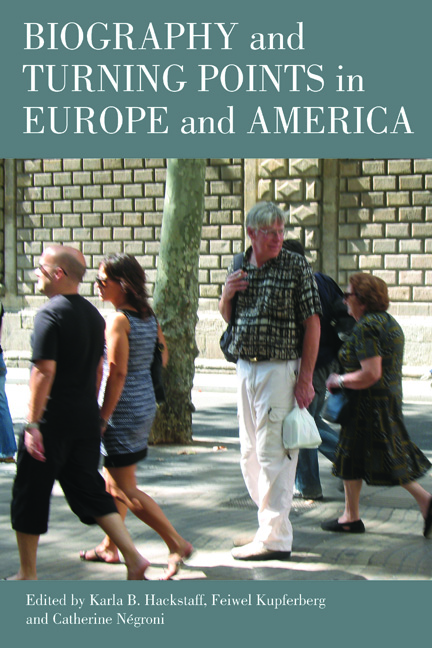Book contents
- Frontmatter
- Contents
- Notes on contributors
- Introduction: Advancing the dialogue on turning points
- one Unpacking biographical narratives: investigating stories of artistic careers in Northern Jutland, Denmark
- two Turning points in the life course: a narrative concept in professional bifurcations
- three Conjugal separation and immigration in the life course of immigrant single mothers in Québec
- four Migration biography and ethnic identity: on the discontinuity of biographical experience and how turning points affect the ethnicisation of biography
- five Biographical structuring through a critical life event: parental loss during childhood
- six Decisive turning points in life trajectories of violence among young men in the barrios of Caracas: the initiation and biographical reconversion to non-violent lifestyles
- seven The turning points of the single life course in Budapest, Hungary
- eight Complicating actions and complicated lives: raising questions about narrative theory through an exploration of lesbian lives
- nine Religious conversion as a biographical turn/ing: the case of Orthodox believers in contemporary Russia
- ten Conclusion: theorising turning points and decoding narratives
- Index
Introduction: Advancing the dialogue on turning points
Published online by Cambridge University Press: 01 September 2022
- Frontmatter
- Contents
- Notes on contributors
- Introduction: Advancing the dialogue on turning points
- one Unpacking biographical narratives: investigating stories of artistic careers in Northern Jutland, Denmark
- two Turning points in the life course: a narrative concept in professional bifurcations
- three Conjugal separation and immigration in the life course of immigrant single mothers in Québec
- four Migration biography and ethnic identity: on the discontinuity of biographical experience and how turning points affect the ethnicisation of biography
- five Biographical structuring through a critical life event: parental loss during childhood
- six Decisive turning points in life trajectories of violence among young men in the barrios of Caracas: the initiation and biographical reconversion to non-violent lifestyles
- seven The turning points of the single life course in Budapest, Hungary
- eight Complicating actions and complicated lives: raising questions about narrative theory through an exploration of lesbian lives
- nine Religious conversion as a biographical turn/ing: the case of Orthodox believers in contemporary Russia
- ten Conclusion: theorising turning points and decoding narratives
- Index
Summary
As long as we have a notion of a self-identity, most people have a moment in their life when they have been forced to recognise, as a result of events, that ‘I am not the same as I was, as I used to be’ (Strauss, 1959, p 95). This is the basic definition of the sociological concept of ‘turning points’ provided by Anselm Strauss in his 1959 book, Mirrors and masks: The search for identity. Since then it has been an important sociological concept for investigating identities over a lifetime in the context of an ever-changing structural, cultural and interpersonal environment. Subsequent to Strauss's work, the theoretical, methodological and empirical advances associated with the use of ‘turning points’ have been multiple, nuanced and complex. In particular, we have found that turning point, and other closely related, even overlapping concepts (such as narrative, biographical work and bifurcation) require a full-blown treatment in a collection that aims to demonstrate its enduring utility in relation to sociological accounts of life stories. Thus, this anthology uses this classical concept of turning points to understand reflexive narrations of life stories traversing organisational fields or institutions, across life events, and within diverse countries. This text provides a unique contribution to the literature in three ways: (1) it updates theoretical reflections surrounding the critical concept of turning points; (2) it integrates methodological advances in qualitative research (such as discourse analysis and interpretative methods) in relation to new empirical research; and (3) it provides an array of current international voices situated in Europe and the Americas.
Theoretical, methodological and international contexts
The edited collection first took shape when Feiwel Kupferberg organised two panels on turning points for the International Sociological Association meetings of September 2008, which met in Barcelona, Spain. This context brought together international scholars from the UK, Sweden, Germany, Denmark, France, Hungary, Russia, Canada, the US and Venezuela. While these distinct countries share a Western orientation, they nevertheless provide an array of structural, cultural and historically infused conditions for understanding how turning points relate to constructions of meaning by a nation's members. This text addresses increasingly globalised concerns regarding the identities and simultaneously structurating forces of gender, age, ‘race’-ethnicity, class, sexuality and religion, which are, nevertheless, grounded in the unique nations and communities that we include here.
- Type
- Chapter
- Information
- Publisher: Bristol University PressPrint publication year: 2012

